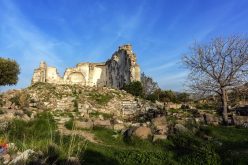Daskyleion

Daskyleion
Daskyleion, archaeological research carried out in the city has shown that this localization had been settled since the Bronze Age. Therefore, these studies have confirmed the words of the Greek historian Dionysius of Halicarnassus, who mentioned that Daskyleion had prospered in the times of the Trojan War. What’s more, Strabo, the ancient geographer wrote that after that war the colonists for Aeolis settled in Daskyleion.
During the first two centuries of the first millenium BC Daskyleion was under Phrygian control. City walls and the fragments of Cybele temple have remained from these times. Around 700 BC the city was conquered by Lydians. According to the local legend it was then called Daskyleion in order to honour Dascylus, the father of Lydian king Gyges.
When the Persians conquered Lydia in the mid-6th century BC, Daskyleion became the capital city of Hellespontine Phrygia satrapy, comprising lands of Troad, Mysia and Bithynia. The location of this satrapy was of great strategic importance to the Persians, as it enabled them to control the movement on Dardanelles (i.e. Hellespont strait). The satrapy was ruled by the dynasty of Pharnacides, represented chronologically by Pharnaces I, Artabazus I, Pharnabazus I, Pharnaces II, Pharnabazus II, Ariobarzanes, Artabazus II and Pharnabazus III.
In 395 BC the city was conquered by the Spartan king Agesilaus II, but during the Corinthian War it was reconquered by the Persians. Finally, in 334 BC Daskyleion was captured by Parmenion, a Macedonian general in the service of Alexander the Great. In Hellenistic times the city was administered by the nearby city of Cyzicus as the part of the Kingdom of Pergamon. The structures from this period were raised from the construction material obtained from the earlier Persian buildings.
In the Roman period Daskyleion remained uninhabited, but the remains of military citadel from the Byzantine times have been discovered. Currently, this archaeological site is under protection as the part of Manyas Lake National Park (tr. Kuscenneti Milli Parkı).
Related Articles
Write a Comment
Only registered users can comment.









